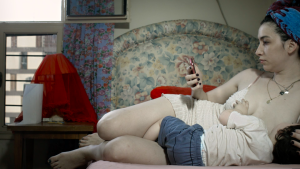SITE IN SPANISH
Affective and Immaterial Labour in Latin(x) American Culture is an AHRC-funded research project led by Dr Rachel Randall (PI). It is running from September 2022 until July 2024. Outputs and information about the project will continue to be added to this site following the project’s official end and as they become available.
The project explores representations of wet-nurses, migrant domestic workers and sex workers in Latin(x) American photography, film, literature and digital culture from the late nineteenth century to the present day. It explores the similarities and differences between these kinds of work by analysing them as forms of immaterial labour, which is work that creates immaterial products, including social relationships, emotional responses and bodily feelings – also termed ‘affects’.

The project asks what an analysis of Latin(x) and Latin American cultural productions featuring these workers can contribute to our understanding of the links between these forms of labour, and to a public appreciation of these kinds of work, which are often marginalised or denigrated.
To explore these issues, we are looking to answer four key research questions:
- Which creative techniques do artists use to explore the challenges faced by Latin American and Latinx migrant workers employed in these forms of affective and immaterial labour?
- How does an analysis of these creative works enable us to compare and contrast between different forms of affective and immaterial labour, such as wet-nursing, sex work and domestic work?
- How can artistic depictions of affective and immaterial labour raise awareness of exploitative employment practices and contribute to a public understanding of the economic, social and cultural value of care work?
- How can artists, academics and activists collaborate effectively and ethically with individuals involved in forms of affective and immaterial labour?
These webpages will be updated regularly with information about events we are organising and links to materials produced as part of the research.
The project is mentored by Professor Bridget Anderson and supported by Migration Mobilities Bristol (MMB).
It is funded by an Arts and Humanities Research Council (AHRC) Research Development and Engagement Fellowship.

